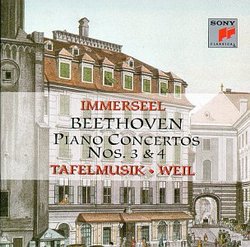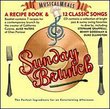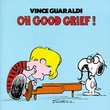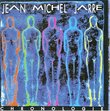| All Artists: Beethoven, Immerseel, Weil, Tafelmusik Title: Piano Concertos 3 & 4 Members Wishing: 0 Total Copies: 0 Label: Sony Release Date: 7/1/1997 Genre: Classical Styles: Forms & Genres, Concertos, Historical Periods, Classical (c.1770-1830), Instruments, Keyboard Number of Discs: 1 SwapaCD Credits: 1 UPC: 074646282427 |
Search - Beethoven, Immerseel, Weil :: Piano Concertos 3 & 4
 | Beethoven, Immerseel, Weil Piano Concertos 3 & 4 Genre: Classical
Performances of Beethoven's piano concertos on "authentic" instruments depend heavily on the tonal qualities of the fortepiano. One reason Beethoven sounds so terrific on a modern piano is that he imagined his music for ... more » |
Larger Image |
CD DetailsSynopsis
Amazon.com Performances of Beethoven's piano concertos on "authentic" instruments depend heavily on the tonal qualities of the fortepiano. One reason Beethoven sounds so terrific on a modern piano is that he imagined his music for as large an instrument as he could get his hands on--and as long as the performer scales his tone to the capacity of his piano, a piece will work. But choose an instrument with too puny a sound, and the result doesn't bear listening to. Jos van Immerseel has selected for these performances a fortepiano with a lovely, full tone that preserves the clarity we've come to expect from period instruments, but which isn't dwarfed by the music. His sparkling playing completes a totally successful release. --David Hurwitz Similar CDs
Similarly Requested CDs
|
CD ReviewsSolid Third, exquisite Fourth concerto Larry VanDeSande | Mason, Michigan United States | 03/02/2007 (4 out of 5 stars) "Opposite their collaboration on the Piano Concertos Nos. 1 and 2 by Beethoven, fortepianist Jos von Immerseel uses Beethoven's cadenzas in this recording, made in the middle 1990s. Immerseel also uses a 19th century instrument by Johann Nepomuk Trondlin of Leipzig that was restored in Antwerp in 1996, probably just before this recording was made. The instrument has a cleaner action than the one he used in Concertos 1 & 2 with marginally less period sound. That said, these performances are not only more closely aligned with traditional Beethoven piano concerto performances, they are quite excellent. While Immerseel and Tafelmusik produce what I would call a solid recording of Piano Concerto No. 3, the jewel of this CD is the Piano Concerto No. 4, where Immerseel displays a nearly magical touch in the quieter moments contrasted by almost Elgarian passion and dignity in the final movement, where I have never heard better period keyboard playing. Tafelmusik, with its somewhat sour-sounding strings and period instruments, is nevertheless right there with the soloist all the way through. I assume the sour sound comes from instrumental tuning to the period era and not from poor playing, for the orchestra members shine brightly during their various solo moments. Jeanne Lamon is perfectly attuned to Immerseel's approach and supports him well, aside from a nearly martial tutti beginning the slow movement of Concerto 4 on both sides of the solo entry. Immerseel is equally memorable in the slow movement of Concerto 3, with exquisite sensitivity built around Beetoven's complex voicing. Sony's outstanding, wide-ranging and spacious sound fills out this installment of Beethoven's concertos. For these reasons, I'd say this is the better of the two CDs and the better value for anyone that's poking around in this repertoire at a time these CDs are NLA in the new marketplace. Certainly you can acquire this used via an Amazon vendor for a reasonable price; if so don't delay becuase the day has already arrived when this group's collaboaration on the "Emporer" concerto, linked to Vera Bleth's performance of the Violin Concerto, is an expensive buy if and when you can find it." Beethoven on Period Instruments Larry VanDeSande | 02/19/2004 (4 out of 5 stars) "Beethoven's 4th concerto is one of the most under-represented of his great works, and deserves more attention. I am glad to see this on the market.Some people love period instruments and some feel quite hostile. I happen to like them, especially handled skillfully live, when a spectator has a perfect "aural view" of the overall sound. Well, we are lucky to have both, and this recording is from the other side. I have owned this recording for several years and have listened to it scores of times.This particular recording is good, but not excellent. The sound I expect from period instruments chiming, sawing and piping away, leading to audience to understand something long-untranslated in the music, a musical sort of rosetta stone, is NOT clearly represented here. Rather than the delicate vibrato of thin reeds, "unpolished" and hand-shaped brass, loose bows breathing against strings, and a woody throatiness in the winds, you simply hear a dimmed down version of a modern orchestra. I suspect this is due to insufficient or badly placed mics, and a muddy reverb in the hall. I triple-checked: Tafelmusik uses real period (and reconstructed) instruments. Although the pedigree is right, we get the almost inbred "uber" sound that we hear with modern instruments and orchestras, albeit slightly muddied and dimmed in the recording's soundscape.The solo piano sounds quite like a pianoforte, delicate, responsive and more "real", ironically facilitating a more "fantastic" performance. You will be aware, even with Immerseel's competent handling, and Tafelmusik's steady, controlled treatment; the dynamics of this instrument are less than those of a modern piano. Along with the delicacy comes a crisp and delicate effect as adequate compensation, especially in the soft, quick passages during the first movement.Unfortunately, some of this effect is also lost in the overall muddy reverb and tonal spectrum, as the mic-work, mixing and hall seem to trim back the meatiness that the performance obviously struggles to incarnate.4 stars: a pleasurable, but not spectacular product. This recording misses the delicate voice that period instruments possess. It's a great shot, taken with the wrong lens."
|

 Track Listings (6) - Disc #1
Track Listings (6) - Disc #1




